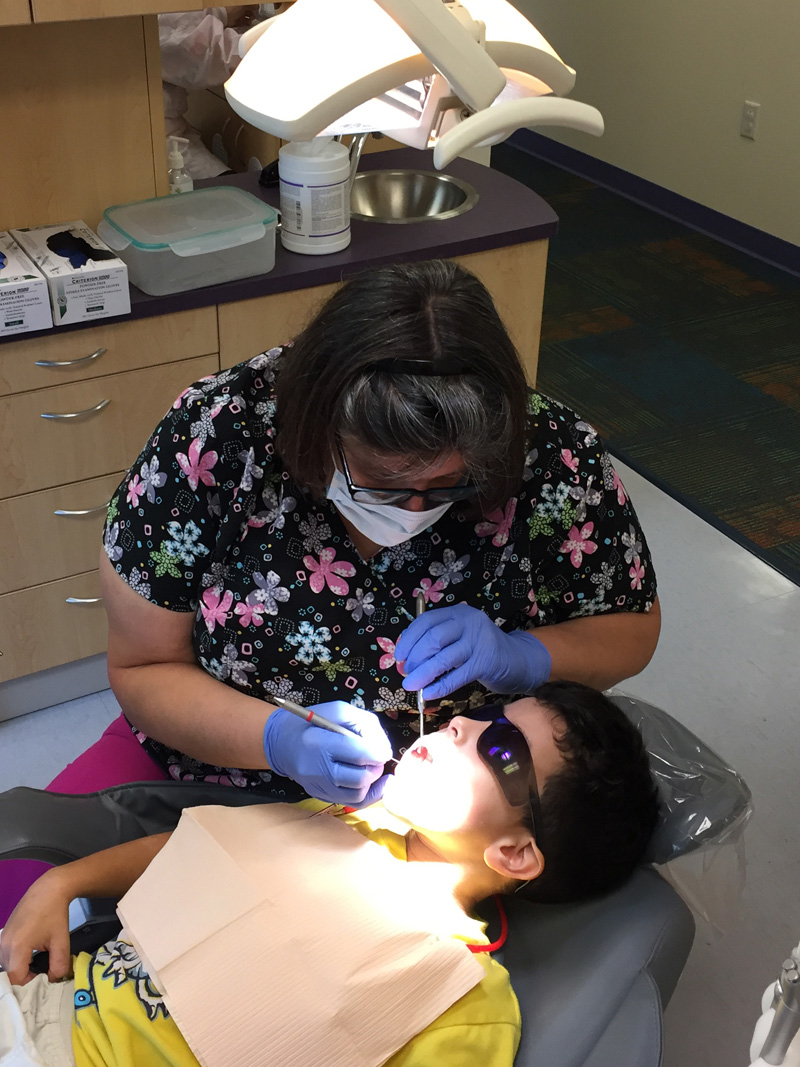Preparing for Your Child’s First Dental Visit

It is important to have a Dental Home.
Everyone should have a Dental Home. “Dental Home” means an ongoing relationship with a dentist and patient. It includes all aspects of oral health care, delivered in a comprehensive, continuously accessible person or family-centered way. The establishment of a dental home for the child should begin no later than 12 months of age.
Your Child’s First Dental Visit
When your child’s first tooth appears or first birthday (whichever comes first), talk to your dentist about scheduling the first dental visit. Treat the first dental visit as you would a well-baby checkup with the child’s physician. Remember: starting early and routine visits are the key to a lifetime of good dental health. For more information about nutrition and your baby, visit the Academy of Nutrition and Dietetics.
- Consider making a morning appointment when children tend to be rested and cooperative
- Keep any anxiety or concerns to yourself. Children can pick up on your emotions, so emphasize the positive
- Never use a dental visit as a punishment or a threat
- Never bribe your child
- Talk with your child about visiting the dentist
During this visit, you can expect the dentist to:
- Discuss treatment, if needed, and schedule the next appointment
- Inspect for oral injuries, cavities, or other problem
- Let you know if your child is at risk of developing tooth decay
- Clean your child’s teeth and provide tips for daily care
- Discuss teething, pacifier use, or finger/thumb sucking habits
Anxiety
If your child has questions about an upcoming appointment, please do not overwhelm him/her with too much information.
Simple answers are best, such as: “The dentist is going to clean the germs off of your tooth and the dentist will make your tooth smooth again”.
Also, any anxiety displayed by parents will be “picked up” by the child. Don’t tell your child about any unpleasant dental experiences you may have had.
Why Are the Primary Teeth Important?
It is very important to maintain the health of the primary (baby) teeth. Neglected cavities can and frequently do lead to problems which affect developing permanent teeth. Primary (baby) teeth are important for:
- permitting normal development of the jaw bones and muscles.
- providing space for permanent teeth and guiding them into the correct position
- proper chewing and eating
Primary teeth also affect the development of speech and add to an attractive appearance. While the front 4 teeth last until 6-7 years of age, the back teeth (cuspids and molars) aren’t replaced until age 10-13.
Dental Language
Here is a list of terms we prefer to use in our office. Over the years, we have found these words to help children feel much more comfortable, and less anxious. These alternate words help children have a better visit.
Thank you for helping us provide quality dental care for your child and making each visit a positive experience.
| Instead of … | We prefer to say … |
|---|---|
| Radiographs or x-rays | Tooth pictures |
| Poke with explorer or sharp instrument | Tooth counter |
| Suction | Mr. Thirsty or Thirsty Straw |
| Cavities | Sugar Bugs |
| Fluoride treatment | Tooth vitamins |
| Laughing Gas / Nitrous Oxide | Happy Air |
| Give a shot or use a needle | Spray sleepy juice |
| Mouth prop | Tooth chair or pillow |
| Clamp | Tooth hugger or ring |
| Drill the tooth | Polish the tooth |
| Fillings | Paint or polish |
| Pull or yank the tooth | Wiggle the tooth |
| Impressions | Tooth prints or play-doh |

